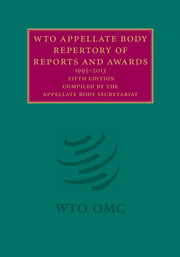Book contents
- Frontmatter
- Contents (outline)
- Contents
- Foreword to the 1995–2013 edition
- List of Abbreviations for Parts I and II
- Part I Appellate Body Reports
- A
- B
- C
- D
- E
- F
- G
- H
- I
- J
- L
- M
- N
- O
- P
- Q
- R
- S
- T
- V
- W
- PART II Arbitration Awards under Article 21.3(c) of the DSU
- Annexes
- Abbreviations used in the Table of References to the Covered Agreements and Other Instruments and in the Indexes
- Table of References to the Covered Agreements and Other Instruments by Article
- Subject Index
- Subject Index by Case (Appellate Body Reports)
- Subject Index by Case (Arbitration Awards under Article 21.3(c) of the DSU)
I
from Part I - Appellate Body Reports
Published online by Cambridge University Press: 05 March 2015
- Frontmatter
- Contents (outline)
- Contents
- Foreword to the 1995–2013 edition
- List of Abbreviations for Parts I and II
- Part I Appellate Body Reports
- A
- B
- C
- D
- E
- F
- G
- H
- I
- J
- L
- M
- N
- O
- P
- Q
- R
- S
- T
- V
- W
- PART II Arbitration Awards under Article 21.3(c) of the DSU
- Annexes
- Abbreviations used in the Table of References to the Covered Agreements and Other Instruments and in the Indexes
- Table of References to the Covered Agreements and Other Instruments by Article
- Subject Index
- Subject Index by Case (Appellate Body Reports)
- Subject Index by Case (Arbitration Awards under Article 21.3(c) of the DSU)
Summary
Implementation of DSB Rulings. See Review of Implementation of DSB Rulings, Article 21.5 of the DSU (R.4)
Implementation Recommendations – Article 19.1 of the DSU. See also SCM Agreement, Article 4.7 – “withdraw the subsidy without delay” (S.2.19); SCM Agreement, Article 7.8 – Remedies (S.2.19C)
I.0.1 US – Upland Cotton, paras. 272–273
(WT/DS267/AB/R)
The question whether an expired measure is susceptible to a recommendation under Article 19.1 of the DSU is a different matter. The Appellate Body in US – Certain EC Products confirmed that the 3 March Measure had ceased to exist. It noted that there was an obvious inconsistency between the finding of the panel that “the 3 March Measure is no longer in existence” and the panel's subsequent recommendation that the Dispute Settlement Body (the “DSB”) request the United States to bring the 3 March Measure into conformity with its WTO obligations. Thus, the fact that a measure has expired may affect what recommendation a panel may make. It is not, however, dispositive of the preliminary question of whether a panel can address claims in respect of that measure.
… Article 7.8 of the SCM Agreement provides that, where it has been determined that “any subsidy has resulted in adverse effects to the interests of another Member”, the subsidizing Member must “take appropriate steps to remove the adverse effects or … withdraw the subsidy” (emphasis added). The use of the word “resulted” suggests that there could be a time-lag between the payment of a subsidy and any consequential adverse effects. If expired measures underlying past payments could not be challenged in WTO dispute settlement proceedings, it would be difficult to seek a remedy for such adverse effects. Further – in contrast to Articles 3.7 and 19.1 of the DSU – the remedies under Article 7.8 of the SCM Agreement for adverse effects of a subsidy are (i) the withdrawal of the subsidy or (ii) the removal of adverse effects.
- Type
- Chapter
- Information
- WTO Appellate Body Repertory of Reports and Awards1995–2013, pp. 553 - 614Publisher: Cambridge University PressPrint publication year: 2014



